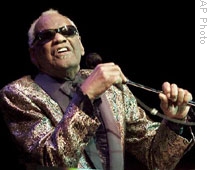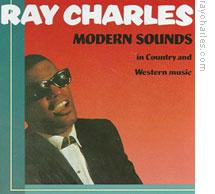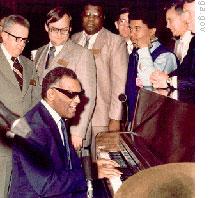VOA慢速英语-People In America - Ray Charles, 1930-2004: He Creat
搜索关注在线英语听力室公众号:tingroom,领取免费英语资料大礼包。
(单词翻译)
He said many times that he would not trade his musical ability for the ability to see again. Transcript1 of radio broadcast:
28 June 2008
VOICE ONE:
This is Faith Lapidus.
VOICE TWO:
And this is Doug Johnson with People In America in VOA Special English.
(MUSIC)
VOICE ONE:
 |
| Ray Charles |
Last week, we began the story of a blind musician who had a huge influence on American popular music. He was famous for his recordings3 of jazz, rock-and-roll, blues4 and country music. His name was Ray Charles Robinson. But the world knew him better as Ray Charles.
(MUSIC: "Let''s Go Get Stoned")
VOICE TWO:
The name of that song is "Let's Go Get Stoned." It is an example of Ray Charles' own kind of music—his own sound. He worked hard for several years to create that sound. No one ever tried it before. He mixed black church music, blues and rock-and-roll. The sound was extremely successful. In the nineteen fifties, his records began to sell millions of copies.
At the same time, Ray Charles recorded jazz music. Those records sold well, too. Critics said they were new and exciting. Listen to his jazz song, "Sweet Sixteen Bars."
(MUSIC)
VOICE ONE: Ray Charles became famous because he could play blues, rock and jazz. He also liked other kinds of music. He told record company officials that he wanted to record an album of country-and-western music.
Ray Charles became famous because he could play blues, rock and jazz. He also liked other kinds of music. He told record company officials that he wanted to record an album of country-and-western music.
The president of the record company told him it would be a mistake. He said Ray's fans would not buy the album. Charles disagreed. He said he believed he would gain many new fans to replace the few he might lose. He produced the album and it was an immediate5 success.
The album was called "Modern Sounds in Country and Western Music." Many of the songs were major hits. One of the most popular was "I Can't Stop Loving You." It is a country-and-western song with Ray Charles' sound of blues and black church music.
(MUSIC)
VOICE TWO:
Ray Charles lived in a world of sound. For six months each year he traveled with his orchestra6, performing in theaters. For the other six months, he worked in his recording2 studio in Los Angles7, California. He did much of the recording work to produce his own albums.
Ray Charles would often say that sound and music were his life's blood. In fact, he said many times that he would not trade his musical ability for the ability to see again.
You begin to understand what sound meant to Ray Charles when you learn that he helped create and support the Robinson Foundation8 for Hearing Disorders9. This organization helps people deal with the loss of their hearing.
You might think Ray Charles would have given his time and money to help the blind. He did not. He once said: "Being blind is my handicap10. But ears are my opportunity." He said losing his hearing would have ended his life.
VOICE ONE:
Ray Charles lived a long life that included his share of problems. There was a time when he used illegal drugs. He was married and divorced11 several times. Yet the Ray Charles sound, and his success, continued.
 |
| Ray Charles performing ''Georgia on My Mind'' at the Georgia State Capitol in 1979 |
He received twelve Grammy Awards from the recording industry. He was one of the first musicians to be elected to the Rock-and-Roll Hall of Fame. Several universities honored12 him. So did the French and American governments. His home state of Georgia made his recording of "Georgia on My Mind" the official state song.
Several years ago, Ray Charles was asked to sing at a political convention13. He performed the song "America the Beautiful." Many people thought his recording was the best ever made.
(MUSIC)
VOICE TWO:
Ray Charles always said he owed most of his success to his mother. He said when he was a boy, she taught him a valuable lesson. She told him: "You can do anything you want to do. You cannot use your eyes. But you can work hard and use your brain."
Ray Charles died June tenth, two thousand four at the age of seventy-three. Music experts say he did more than anyone in the twentieth century to change American popular music.
VOICE ONE:
More than one hundred years ago, Alice Cary wrote a poem that could have been written for Ray Charles. She wrote:
My soul is full of whispered song, --
My blindness is my sight;
The shadows that I feared so long
Are full of life and light.
(MUSIC: "Seven Spanish Angels")
VOICE TWO:
This program was written by Paul Thompson. It was produced by Lawan Davis. This is Doug Johnson.
VOICE ONE:
And this is Faith Lapidus. Join us again next week for another PEOPLE IN AMERICA program in VOA Special English.
 收听单词发音
收听单词发音 




